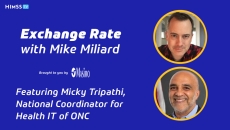Interoperability
The National Coordinator for Health IT discusses the new information blocking rules, the value of FHIR and open APIs and how data exchange is evolving for a more robust public health response.
The agency is floating new requirements for hospitals to report on syndromic surveillance, immunization registries, electronic case reporting and electronic reportable laboratory results. It also has new plans for quality reporting.
Built with help from Edifecs, the CAQH Endpoint Directory can help enable more widespread data sharing among app developers, payers and state Medicaid agencies as the new regs come online.
SPONSORED
Twilio’s Sr. Global CX Consultant, Mauro Faili, discusses innovation and strategizes how to reimagine communication operations using existing system data.
The framework calls on the federal government to partner with other public health authorities and the private sector to ensure patient safety and security.
The National Health IT Collaborative for the Underserved says its goal is to make social determinants of health data available to institutions that may not have had access to it.
The right technology applications can turn the COVID-19 vaccination program into a game-changer for the healthcare industry.
The Vaccination Credential Initiative is planning to finalize two implementation guides in April, and expects to start integrating the SMART Health Cards spec into an array of consumer-facing apps and systems in May.
Harmony Healthcare IT VP Jim Hammer offers advice to healthcare provider organizations seeking to consolidate systems and data, and comply with the Cures Act.
Nearly half of respondents to a recent survey said they were not familiar with the term "information blocking," although 70% said they were aware of rules taking effect on April 5.










